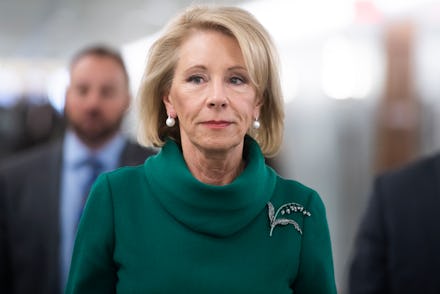The Senate just made loan forgiveness easier for students swindled by for-profit colleges

In a somewhat surprising move, the Republican-led Senate voted Wednesday to reverse a Department of Education rule that made it difficult for students who had been misled by for-profit colleges to get their loans forgiven. The rule had been installed by Education Secretary Betsy DeVos.
Ten Republican senators joined Senate Democrats in voting 53-42 to reverse the policy by means of the Congressional Review Act, which allows Congress to overturn federal policy with a simple majority from both the Senate and the House. It does, however, require presidential approval to be finalized. President Trump has threatened to veto the bill, though experts say this is unlikely given the Republican support for it.
The initiative, led by Democratic Sen. Dick Durbin (Ill.), follows a heated battle in 2019 between congressional Democrats and DeVos, who repeatedly refused to consider forgiving the debt of nearly 100,000 students who claimed that they had been defrauded by their colleges and universities. In most higher education fraud cases, students were misled or lied to by for-profit colleges and universities about repayment programs, educational programs offered, job prospects or ability to transfer credits.
In one instance, the for-profit Corinthian Colleges Inc. guaranteed employment after graduation as a way to attract potential students. A Reveal later investigation found that "between 2011 and 2014, students borrowed $568 million in Genesis loans," which were private loans marketed by the university — with interest rates at 14%.
Students who took out a federal loan in order to pay for college are protected by what’s called the borrower’s defense, a 1995 law that protects consumers from fraudulent business activities and relieves them from responsibility of paying for goods and services they did not receive.
During the Obama administration, the borrower’s defense was expanded to protect students. But after President Trump took office, the DOE spent years saying that it would not extend the debt relief practice to students — a decision that prompted attorneys general from 18 states and the District of Columbia to sue DeVos. In December 2019, the department announced that students could receive partial relief under a complicated plan that involved measuring student earnings against one another by academic program.
The adjustment to the program meant that students who managed to get a higher-paying job after navigating a fraudulent university received less financial relief than a student who took a lower-paying job. Experts said that this practice was not only arbitrary, but illegal, and that it prevented students from full legal protection under the law.
About the Senate vote, Education Department spokeswoman Angela Morabito said in a statement, “It’s disappointing to see so many in Congress fooled by misinformation from the left and the fake news narrative about our efforts to protect students from fraud. ... Our rule is consistent with Congress’s intent, it protects students and it treats taxpayers fairly.”
In reversing the DOE rules, the Senate vote stands as a sharp rebuke to the standards set by DeVos, who was just last week petitioned to change the rules by which borrowers with disabilities can receive relief.